23 August 2023 - EAHP supports a joint statement on the Hospital Exemption!
The EAHP EU Monitor is a regular round up of news relevant to hospital pharmacy in Europe.
EAHP supports a joint statement on the Hospital Exemption in ATMPs!
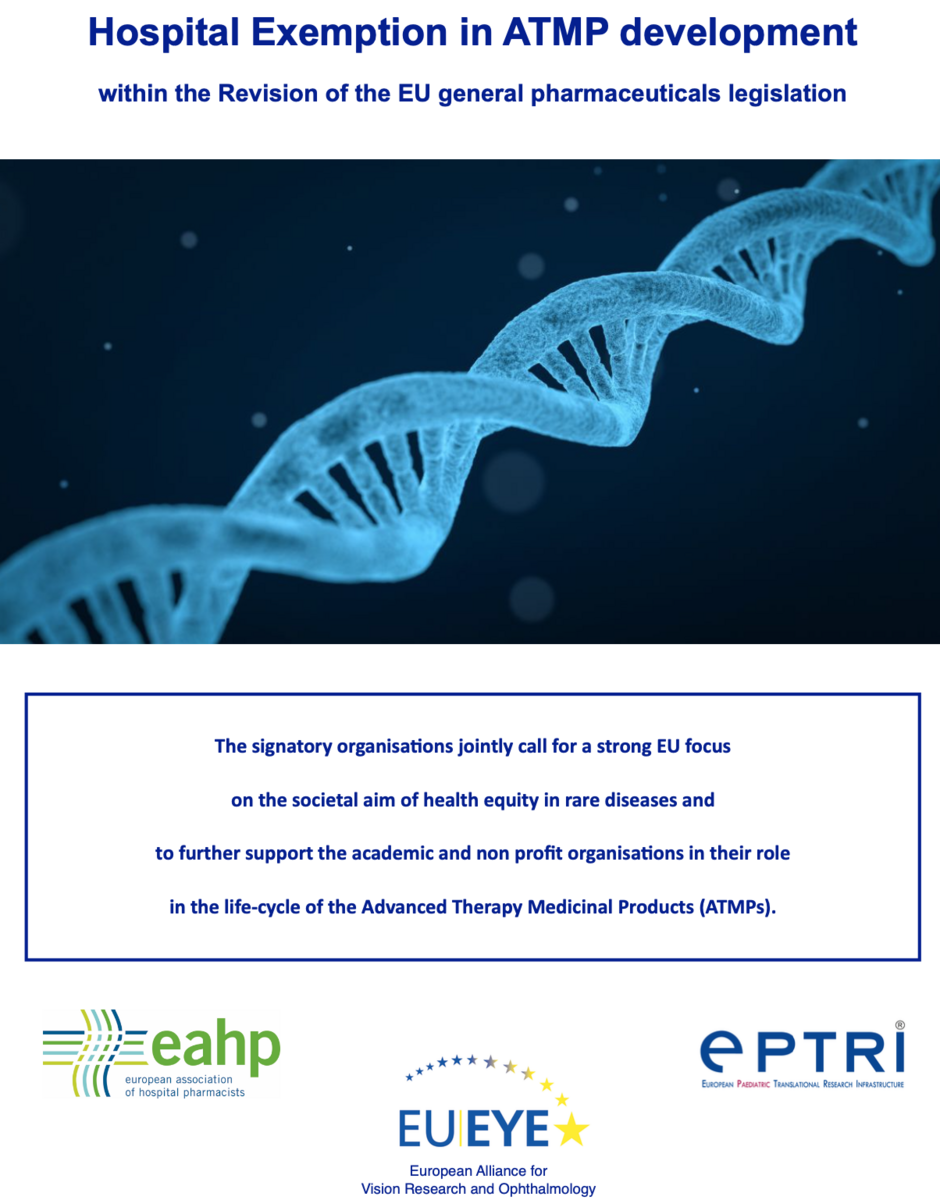
In July, EAHP co-signed a joint statement on the Hospital Exemption in Advanced Therapy Medicinal Products (ATMPs) development within the Revision of the EU general pharmaceutical legislation with the European Alliance for Vision Research and Ophthalmology (EUEYE) and the European Paediatric Translational Research Infrastructure (EPTRI).
The signatory organisations jointly call on the European Commission to maintain a strong focus on the societal aim of health equity and to further support our researchers, clinicians, and hospital pharmacists in their various roles in the ATMP life cycle by:
- defining interests of all stakeholders for a sincere public dialogue and collaborative approach - patients, researchers/developers, healthcare professionals, industry, payers;
- creating a straightforward and affordable authorisation procedure for academic HE- ATMPs drawing from national experiences;
- addressing borderline classification issues to encourage innovation particularly in rare paediatric diseases;
- defining clearly the legal responsibility across the medical practitioners and the hospital management given the multiple factors involved in ATMP evaluation;
- adopting a comprehensive holistic action plan that recognises the key strategic role of multidisciplinary education and training at all levels (development, manufacturing, delivery) including public awareness of availability of treatments;
- fully assessing the impact of the proposed legislation including cost differences between commercial and academic/non-profit settings; different intellectual property models; and reimbursement sources for HE-ATMPs;
- potentially decoupling cost of development from production according to product characteristics with fine-tuning of relevant regulations related to intellectual property, exclusivity rights, and licensing;
- allowing use of clinical data from observational studies for marketing authorisation;
- support the creation of an industry based on the model of Contract Manufacturing Organizations for selected ATMPs with cost sharing for Good Manufacturing Practice and Good Laboratory Practice wherever appropriate.
Furthermore, the joint statement underlines that hospital pharmacists play a pivotal role in the handling of ATMPs as licensed medicines since they fall under their responsibility and their knowledge of pharmacoeconomics and clinical evaluations is essential in assessing the added value of an ATMP.
Also, harmonised education and training of healthcare professionals are important for coordinated practices of the hospital exemption including the development of European education and training materials with the integration of ATMP training in pharmacy and medicine schools. The collaboration of scientific societies involved across the entire ATMP spectrum is essential as well as of professional bodies offering continuing education programmes.
You can read the joint statement HERE
In Memory of Dominique Jordan
 On 19 August 2023, Dominique Jordan, an outstanding Swiss community pharmacist, passed away. He has been the President of the International Pharmaceutical Federation (FIP) from 2018 until his death. At FIP, he led the organisation during the COVID-19 pandemic and created the "One FIP" view to have more collaboration between the different constituencies of FIP. Also, between 2014 and 2018 he served the organisation as chair of the Board of Pharmaceutical Practice. Mr. Jordan advocated for the advancement of the pharmacy profession all across the globe. He has also been the President and CEO of the Swiss Association of Pharmacists.
On 19 August 2023, Dominique Jordan, an outstanding Swiss community pharmacist, passed away. He has been the President of the International Pharmaceutical Federation (FIP) from 2018 until his death. At FIP, he led the organisation during the COVID-19 pandemic and created the "One FIP" view to have more collaboration between the different constituencies of FIP. Also, between 2014 and 2018 he served the organisation as chair of the Board of Pharmaceutical Practice. Mr. Jordan advocated for the advancement of the pharmacy profession all across the globe. He has also been the President and CEO of the Swiss Association of Pharmacists.
He was an outstanding pharmacist and due to his contributions to the pharmacy community, in August 2023, he was distinguished with the "Kamal K. Midha Award for Exceptional Leadership to FIP", being the second person to receive this award. Previously, he was honoured in September 2022 by the Indian Pharmaceutical Association (IPA) with its Fellowship Award due to his support to IPA in developing the pharmacy profession in India.
The International Pharmaceutical Federation (FIP) will be compiling a book of tributes to Dominique Jordan and will provide further details in due course.
Join the webinar on Engaging Patients for Patient Safety!
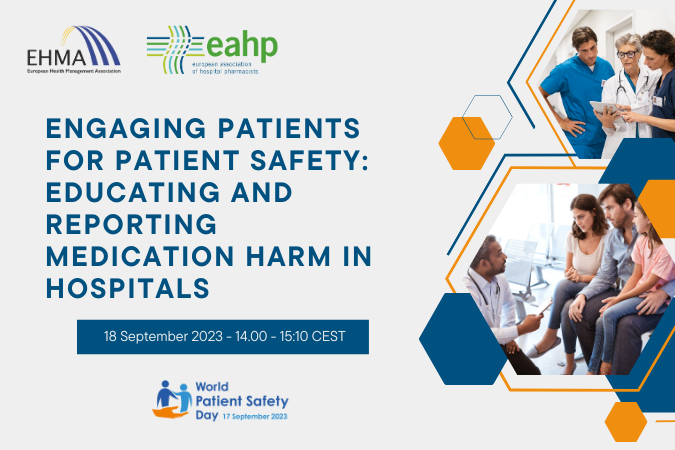 In the context of the upcoming World Patient Safety Day, EAHP is co-organising with the European Health Management Association a webinar on 'Engaging Patients for Patient Safety: Educating and Reporting Medication Harm in Hospitals'. The event will be held on 18 September between 14h00-15h10 (CEST).
In the context of the upcoming World Patient Safety Day, EAHP is co-organising with the European Health Management Association a webinar on 'Engaging Patients for Patient Safety: Educating and Reporting Medication Harm in Hospitals'. The event will be held on 18 September between 14h00-15h10 (CEST).
Access to safe, quality and affordable medicines and their correct administration and use is critical for patient treatment and satisfaction. Consequently, the webinar will raise awareness of the importance of all stakeholders engaging with patients to improve medication safety in hospitals. It will discuss the importance of ensuring that patients are informed about medication safety and know how to report an unintended medication error when it occurs.
The World Patient Safety Day is celebrated annually on 17 September and it aims to raise global awareness about patient safety and calls for solidarity and united action by all countries and international partners to reduce harm to patients. The engagement of patients and their families is essential to eliminate avoidable harm in healthcare.
Find more information about the webinar HERE
Register HERE
EMA's response to the COVID-19 pandemic is out!
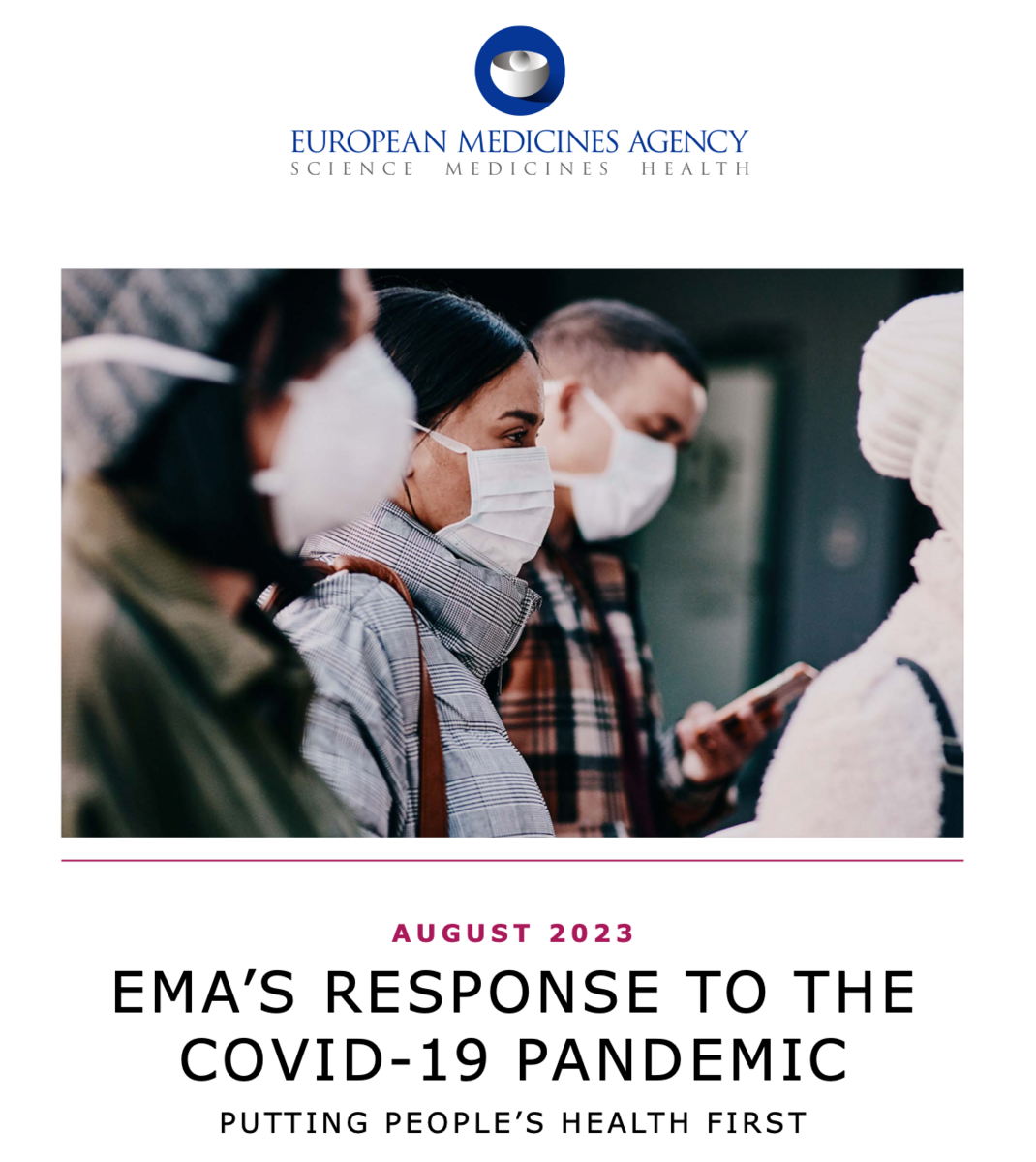 On 10 August, the European Medicines Agency (EMA) launched a paper about the Agency's response to the COVID-19 pandemic by putting people's health first. This report gives an overview of how EMA responded to the pandemic focusing on the period between March 2020 and March 2023.
On 10 August, the European Medicines Agency (EMA) launched a paper about the Agency's response to the COVID-19 pandemic by putting people's health first. This report gives an overview of how EMA responded to the pandemic focusing on the period between March 2020 and March 2023.
It focuses on aspects such as EMA's level of preparedness to deal with public health crisis situations, actions taken during the pandemic to adapt to unforeseen circumstances and demands that required EMA to go beyond its legal frame. The document considers not only the measures taken for the approval of the COVID-19 vaccines and treatments but also the lessons learned with this public health crisis.
Based on the experience with the COVID-19 pandemic, EMA is better equipped to face a new pandemic. On the one hand, the Agency has now its mandate extended to monitor and mitigate shortages of critical medicines and management of major events. On the other hand, the Emergency Task Force has its profile enhanced, including preparedness activities for future crises. EMA's role consists of monitoring outbreaks and epidemics that could become serious threats and developing countermeasures. In this regard, maintaining an overview of medicines in development for future emergencies and coordination activities with other EU institutions are paramount to enable consistent messages across the EU.
Find the paper HERE
Expand your knowledge in critical care pharmacy
 The response to the COVID-19 pandemic and the strain it put on critical care services internationally have highlighted the importance of having a competent and trained critical care clinical pharmacy workforce. The University College Hospital Critical Care Pharmacy Team offers a one-year international course in critical care pharmacy, now in its 4th year, called 'The Fundamentals of Critical Care Clinical Pharmacy'.
The response to the COVID-19 pandemic and the strain it put on critical care services internationally have highlighted the importance of having a competent and trained critical care clinical pharmacy workforce. The University College Hospital Critical Care Pharmacy Team offers a one-year international course in critical care pharmacy, now in its 4th year, called 'The Fundamentals of Critical Care Clinical Pharmacy'.
It comprises 12 monthly sessions on ICU themes, with recorded lectures and live interactive seminars, targeted reading and tasks to complete at one's base unit. The cost is £300 for pharmacists and £150 for pharmacy technicians. A certificate of attendance or competence is offered, the latter based on local sign-off on the completion of tasks/reviews.
The course is intended to:
- Upskill pharmacists who are new to critical care
- Pharmacists covering critical care on weekends/on-call/surge
- Pharmacists in other specialist areas, interested in learning more about critical care
- Pharmacy technicians currently working within critical care.
Learn more about the course and how to enrol HERE
EMA review of data on paternal exposure to valproate
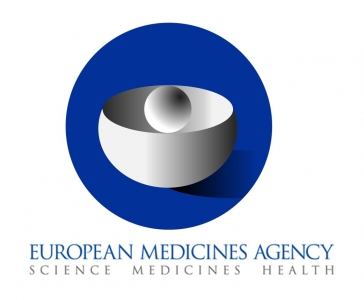 EMA's Pharmacovigilance Risk Assessment Committee (PRAC) is reviewing data on the potential risk of neurodevelopmental disorders (NDDs) in children whose fathers taking valproate medicines.
EMA's Pharmacovigilance Risk Assessment Committee (PRAC) is reviewing data on the potential risk of neurodevelopmental disorders (NDDs) in children whose fathers taking valproate medicines.
The review focuses on data from a retrospective observational study conducted by companies as an obligation following a previous review of valproate use during pregnancy.
This retrospective observational study compared the risk of NDDs (including autism spectrum disorder) in children born to men taking valproate with the risk in children born to men taking lamotrigine or levetiracetam (other treatments for epilepsy). It was carried out using multiple registry databases in Denmark, Norway and Sweden.
Initial results of the study may indicate an increased risk of NDDs in children born to men taking valproate in the three months before conception. However, the PRAC has identified important limitations with the data from the study. In particular, the PRAC had questions about the definition of NDDs used in the study and the specific type of epilepsy the patients had. The latter is important because valproate may be prescribed more often for some types of epilepsy which are associated with NDDs.
In addition, after submitting the study results, the companies informed the PRAC about errors in the Norwegian database; the impact of these errors is not yet known. The PRAC has therefore requested companies to provide analyses of corrected data and additional information as soon as possible to address the limitations.
The PRAC will review the required data as they become available and make an EU-wide recommendation. While awaiting the outcome of the PRAC's evaluation, some Member States have implemented interim national recommendations. Male patients being treated with valproate should not stop taking their medicine without talking to their doctor, as their epilepsy or bipolar disorder could become worse. Sudden discontinuation of treatment for epilepsy could trigger seizures. Patients who have any questions about their treatment should speak to their healthcare professional.
More information is available HERE
Previous recommendations to avoid exposure to valproate medicines in women during pregnancy due to the risk of congenital malformations (birth defects) and neurodevelopmental disorders remain in place can be found HERE
EJHP: Frequency of paediatric patients administered extemporaneous preparations at a Swedish university hospital
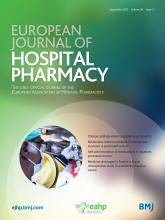 A recent online first article published in the European Journal of Hospital Pharmacy (EJHP) aims to compare frequencies of patients administered extemporaneous preparations in two separate years, 10 years apart (between 2009 and 2019). The study found that the introduction of new authorised products has decreased the need for manipulation or extemporaneous preparations in some therapeutic groups. There remains, however, a pronounced lack of commercially available child-friendly dosage forms and suitable strengths enabling the safe administration of medicines to children.
A recent online first article published in the European Journal of Hospital Pharmacy (EJHP) aims to compare frequencies of patients administered extemporaneous preparations in two separate years, 10 years apart (between 2009 and 2019). The study found that the introduction of new authorised products has decreased the need for manipulation or extemporaneous preparations in some therapeutic groups. There remains, however, a pronounced lack of commercially available child-friendly dosage forms and suitable strengths enabling the safe administration of medicines to children.
Read the article HERE
[Consultations]
European Commission: Survey for the study on the implementation of Europe's Beating Cancer Plan
The European Commission launched a Survey for the study on mapping and evaluating the implementation of the Europe's Beating Cancer Plan with one dedicated to health professionals. The study aims to assess the state of play of the Cancer Plan, identify further actions to support, coordinate and complement Member States' efforts against cancer, and build a monitoring framework to assess the outcomes of Europe's Beating Cancer Plan. The deadline for comments is 22 September 2023.
Contribute HERE
EMA Consultation: Draft ICH E6 (R3) guideline on good clinical practice – step 2b
EMA has published a consultation on the International Conference on Harmonisation (ICH) Good Clinical Practice Guideline to provide a unified standard to facilitate the mutual acceptance of clinical trial data for ICH member countries and regions by applicable regulatory authorities. The guideline builds on key concepts outlined in ICH E8 (R1) General Consideration for Clinical Studies. This includes fostering a quality culture and proactively designing quality into clinical trials and drug development planning, identifying factors critical to trial quality, and engaging stakeholders, as appropriate, using a proportionate risk-based approach. Comments should be provided by 26 September 2023.
Find the document HERE
EMA Consultation: ICH Reflection Paper on international harmonisation of RWE terminology
EMA published an International Council for Harmonisation of Technical Requirements for Pharmaceuticals for Human Use (ICH)'s Reflection Paper on "Proposed international harmonisation of real-world evidence (RWE) terminology and convergence of general principles regarding planning and reporting of studies using real-world data, with a focus on effectiveness of medicines", co-authored by EMA, US FDA and Health Canada. The deadline for comments is 30 September 2023.
Contribute HERE
EMA Consultation: Concept Paper on the development of a Guideline on the quality aspects of mRNA vaccines
The Concept Paper addresses the need to establish a guideline on the quality aspects of mRNA vaccines. The scope of the guideline focuses on the mRNA vaccines against infectious diseases (including self-amplifying mRNA). It is not intended to address specific requirements for mRNA vaccines to be used in clinical trials, but the scientific principles described may also be applicable during pharmaceutical development. The deadline for comments is 30 September 2023.
Contribute HERE
European Paediatric Formulary: Furosemide oral solution monograph
The European Directorate for the Quality of Medicines & HealthCare (EDQM) has just released Issue 7 of Pharmeuropa PaedForm, in which the draft text for Furosemide 2 mg/mL Oral Solution is published for public consultation with a view to its later inclusion in the European Paediatric Formulary. This is the second round of public consultation for this text that was first published in issue 2 of Pharmeuropa PaedForm. The EDQM welcomes all comments on the revised monograph from users and interested parties. The deadline for comments is 30 September 2023.
Contribute HERE
EMA Consultation: reflection paper on the use of artificial intelligence in the lifecycle of medicines
EMA launched a draft reflection paper outlining the current thinking on the use of artificial intelligence (AI) to support the safe and effective development, regulation and use of human and veterinary medicines. The document reflects on principles relevant to the application of AI and machine learning (ML) at any step of a medicine's lifecycle, from drug discovery to the post-authorisation setting. All interested parties are invited to comment on the consultation. The public consultation is open until 31 December 2023.
Contribute HERE
EFCCA Patient Preference Survey
The European Federation of Chron's & Ulcerative Colitis Associations (EFCCA) together with the University of Leuven launched the "Patient Preference Survey". It aims to find out which aspects, factors, and characteristics are important for patients when choosing a treatment for inflammatory bowel disease. The survey has been translated into several languages.
Contribute HERE




